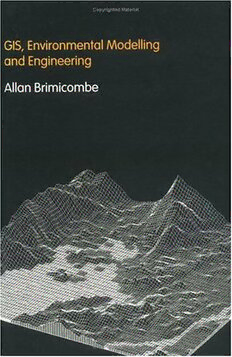
GIS Environmental Modelling and Engineering PDF
314 Pages·2003·6.419 MB·English
Most books are stored in the elastic cloud where traffic is expensive. For this reason, we have a limit on daily download.
Preview GIS Environmental Modelling and Engineering
Description:
Spatial dimensions need to be properly captured if modelling and engineering techniques are to be successfully applied in addressing environmental problems. The links between the geographical information systems (GIS) that capture this data, simulation modelling, and engineering offer tremendous possibilities for building versatile support systems for managing the environment. GIS, Environmental Modelling and Engineering focuses on using GIS and external models to solve real environmental problems, promoting the critical thinking needed for the effective applications of these systems and their analytical outputs.Divided into three major sections, this textbook first concentrates on defining GIS, identifying how data is structured, and explaining common functionality. The text examines GIS from a technological perspective, exploring the evolution of its scientific basis and its synergies with other technologies within a geocomputational paradigm. The next section explores modelling from a neutral scientific perspective in its role of simulating phenomena, as well as from a more specific perspective in its role within environmental science and engineering. The third and largest section looks at how GIS and simulation modelling are joined. It provides case studies and covers issues such as interoperability, data quality, model validity, space-time dynamics, and decision-support systems. This volume provides seniors and postgraduate students with a structured, coherent text that goes beyond introductory subject matter by enabling readers to think critically about the data acquisition process and the results they get from the technology.
See more
The list of books you might like
Most books are stored in the elastic cloud where traffic is expensive. For this reason, we have a limit on daily download.
